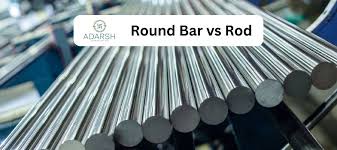Navigating the world of metal forms can be intricate for those involved in machinery, engineering projects, construction, and even arts and crafts. Two common forms often confused are round bars and rods, each with distinct characteristics and uses. This blog post aims to shed light on these differences and help our audience, from engineers to DIY enthusiasts, understand when and why to choose one.
Round Bar: The Backbone of Construction and Machining
Round bars are solid, cylindrical metal bars that are highly versatile and used across various domains. They are generally measured by their diameter, which can range widely to accommodate different needs.
Characteristics:
- Uniform Strength: Due to their symmetrical shape, round bars provide consistent strength and can sustain external pressure from all directions.
- Machinability: These bars are known for their machinability. They can be cut and shaped into tools or machine parts, making them crucial for manufacturing.
- Structural Integrity: In construction, round bars are valued for their ability to reinforce structures, particularly in concrete reinforcement.
Applications:
- Machinery: Components like bolts, gears, and shafts often start as round bars.
- Architecture: for aesthetic features in buildings, such as fences or fencing.
- Industrial: They form the basis for fabrication in manufacturing plants.
Rod – The Versatile Choice for Smaller Projects and Detail Work
Rods are also cylindrical but generally come in smaller diameters. While they sometimes function similarly to round bars, their applications can differ significantly.
Characteristics:
- Flexibility: Rods tend to be smaller and thinner, lending more flexibility for certain applications.
- Finishing Quality: With a smoother finish, rods are often used for visible parts where aesthetics are important.
- Precision: Suited for precision tasks due to their smaller size and more delicate nature.
Applications:
- Electrical: Rods are used in electrical applications where their conductive properties are essential.
- Crafts: Their flexible nature makes them ideal for artistic designs in metalwork.
- Structural Supports: Smaller scale building projects or home DIY uses where less structural integrity is needed.
How to Choose Between Round Bar and Rod?
Considerations:
- Strength Requirements: A round bar is typically a better choice if your project requires high strength.
- Precision and Detail: Opt for rods when working on projects that require attention to detail and précising finishing.
- Size and Flexibility: Evaluate if you need the larger size and reduced flexibility of round bars or if smaller rods would be more suitable.
Throughout industries, from heavy-duty construction to fine artistry, the appropriate selection between a round bar and a rod can mean the difference between efficiency and effectiveness. Understanding your project’s specific requirements will guide you to the right choice with confidence.
By grasping the unique properties and applications, you can ensure your structures are built to last, or your machinery operates flawlessly. Whether standing within the skeleton of a towering skyscraper or crafting the delicate curves of a sculpture, the decision between the round bar and rod shapes the outcome of your endeavors.
Takeaways:
- A round bar is the go-to option for heavy-duty applications requiring durability and high strength.
- When your project is more about precision, intricate work, or aesthetics, choose a rod for its fine finish and flexibility.
We hope this comparison helps you better understand when to use round bars versus rods in your work. Remember, the right materials are the foundation of any great project, so choose wisely and create with confidence!


No comments yet